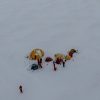For Abdulgadir Sanousi the decision to lock down the capital of Chad was “a nightmare”. His work driving from N’Djamena to Moundou in the south four times a week dried up overnight. This month any work has involved bribing police to let him through the checkpoints at N’Djamena’s four main entry points.
“The situation is just a nightmare for us. We are faced with difficulties by the police. In order to deal with them you need to bribe them, if not they would confiscate your vehicle,” says 27-year-old Sanousi.
President Idriss Déby locked down the city of around a million inhabitants on 1 January. Gatherings and public transport stopped, and schools, places of worship and restaurants closed. Markets, where the majority of the population make a living, also had to shut down. The airport closed except for cargo and the city was put under a dusk to dawn curfew.
On Thursday some restrictions on travel were eased, but the curfew remains in the central African country, which has recorded just over 3,000 cases and 114 deaths since the pandemic was declared last year.
The government supplied food staples to some neighbourhoods, says Sanousi: “They gave us very little stuff, even less than one meal a day.
‘Millions hang by a thread’: extreme global hunger compounded by Covid-19
Read more
“Living in this country is very expensive. You need to wake up very early in the morning and work really hard just for food and basics. Imagine on top of that they locked down the city. People here do not think there’s coronavirus, even if there is, it’s not that severe.”
According to the UN World Food Programme (WPF), 66% of Chadians live in severe poverty and one in three are in need of urgent humanitarian assistance. The oil-rich country ranked 187th out of 189 countries in the 2019 human development index.
In a briefing paper published this week, the WFP said levels of malnutrition were a concern. But there have been no reported disruptions to aid deliveries during lockdown.
“We only have one meal a day,” says Madina Abdullah, who helps her mother sell bakhoor (woodchip soaked in oils) at a N’Djamena market. “These days my daughters and I have to wait for my mother all day so that she could bring us some food from the market. We only have dinner.”
Ahmed Osman, a father of four, who sells secondhand clothes, fears another lockdown. “There are not many buyers, we don’t sell much. Nobody wants to waste their money on clothes, people want to keep that for food, there might be another lockdown at any time. The government here does it without any warning.”
Opposition parties have accused the government of using lockdown to interfere with election campaigning ahead of the presidential vote scheduled for April.
Déby, who seized power in 1990, began his campaign rallies before the measures were introduced, visiting most of the main cities outside N’Djamena.
“He did his rallies and locked the city down to prevent us from doing the same thing,” says Yacine Sakin, a member of the Reformist party, part of an opposition coalition that aims to put forward a candidate in the election.
“The lockdown here is a totally political action. It is not about the coronavirus, the regime has no support from the public and they know that, and they simply want to restrict the freedom of movement of the people.”
It’s not just people living in the capital who have been hit by the lockdown. Chad is home to more than 478,000 refugees, the vast majority from Sudan, and is expecting an increase in refugees from Central African Republic following this month’s election violence.
A Sudanese refugee who has lived in eastern Chad since leaving Sudan in 2004 told the Guardian that he usually travels to N’Djamena regularly for medical checkups, but has been unable to make the journey because of the lockdown.
Haroun Yahya, a 41-year-old father of 14, was shot in Darfur by Janjaweed militia and has multiple leg injuries. “I used to travel to the capital regularly with the help of the UN to get treatment, now I have been depending on local medicines to ease my pain,” he says.























































Свежие комментарии